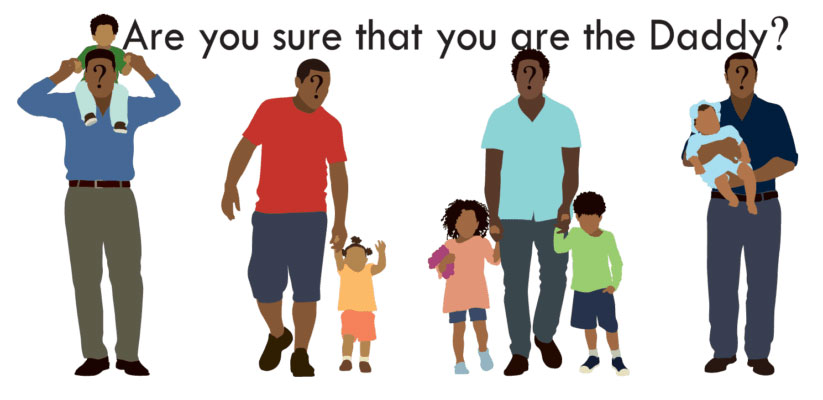MONTEGO BAY, Jamaica February11, 2024 - In the heart of Kumasi, the ancient capital of Ashanti Kingdom, in Ghana, a tale unfolds that captures the essence of love, betrayal, and the quest for truth. Kwadwo Danso, a man who for 16 years embraced the joys and challenges of fatherhood, was faced with a revelation that would alter the course of his life and that of his daughter.
The story, rich in emotional depth, begins with Danso's unwavering commitment to his daughter, a bond he believed was forged by blood and love from the very start.
Danso's relationship with Akua Ataa, the mother of his child, was rooted in shared dreams and a future they planned to build together. From the moment Ataa announced her pregnancy, Danso stepped into the role of a father with all the dedication his heart could muster.
However, the winds of doubt began to stir when rumors surfaced, suggesting that the girl bore a striking resemblance to another man, a figure from Ataa's past who had since moved abroad. The whispers grew louder, echoing questions about the true lineage of the child Danso had raised as his own.
Seeking answers and hoping for peace, Danso turned to a platform known for shedding light on personal dilemmas, Nhyira FM Obra show in Kumasi. It was here that he sought the intervention of science to lay to rest the swirling rumors—through a paternity test. The results were a testament to his fears: a 99.9% certainty that the child he had raised, loved, and envisioned a future with was not his by blood.
The revelation was a maelstorm of emotions for Danso, a man who had woven his dreams around his daughter. Overwhelmed and seeking solace in justice, he proposed compensation for the years of love, care, and financial support he had provided.
The figure he arrived at was GH¢20,000 (USD$1,615.57) for each year, summing up to GH¢320,000—(USD$26,771.65) a reflection of the depth of his investment, both emotional and financial. After negotiations, a semblance of resolution was reached at GH¢250,000, (USD$20,194.61) a figure that spoke volumes of the complexities of human relationships and the cost of truth.
Akua Ataa's side of the story added layers to the emotional labyrinth. She confessed to discovering the true paternity of her daughter when the child was eight years old but chose silence, a decision influenced by clandestine support from the biological father. This revelation paints a picture of tangled lives, where secrets held the power to unravel the fabric of a family.
This story, emerging from Accra, is not just a narrative of personal upheaval but a mirror reflecting the intricate dance of relationships, the weight of truth, and the resilience of the human spirit in the face of life's unpredictabilities.
As Danso grapples with the aftermath of this life-altering revelation, his journey is a poignant reminder of the complexities of love, the pain of loss, and the quest for closure in the intricate tapestry of human connections.
Many men have been unknowingly raising children that are not theirs and to curb the trend, there have been calls for introduction of mandatory DNA testing at birth
 An analysis carried out on 300 paternity test cases by a DNA testing agency in Lagos, Nigeria, revealed that 46% of fathers tested were not the biological farthers of the children. While, according to the embassies in Ghana, 30% of 354,000 men who took paternity tests in 2003-2006 were not the biological fathers of the tested children while in Nigeria.
An analysis carried out on 300 paternity test cases by a DNA testing agency in Lagos, Nigeria, revealed that 46% of fathers tested were not the biological farthers of the children. While, according to the embassies in Ghana, 30% of 354,000 men who took paternity tests in 2003-2006 were not the biological fathers of the tested children while in Nigeria.
However, a 2016 report published by the Nigerian Tribune stated that approximately 30 per cent of men who took DNA tests in Nigeria to determine paternity discovered they were not the biological fathers of their children.
Reports have been making the rounds that Nigeria has the second highest rate of paternity fraud in the world after Jamaica, which recent revelations by Dr Andre McDonald, the CEO of SureTime Emergency Medical Services in Jamaica, reveal that over 70 per cent of paternity tests conducted at SureTime indicate that the presumed fathers are not biologically related to the tested children.
Some countries have begun waging a war against lost identities on behalf of children and preventing paternity fraud by offering DNA tests at birth. A couple can elect not to do the test, but would forego the ability to challenge biological evidence in the future.
DNA testing has now become so popular, that countries like the UK , the United States and Canada are demanding DNA tests in family applications for residency visas. In addition, some countries want to introduce a law called paternity fraud in cases where a man looks after a child who the woman knows is not the biological father of the child.
It is vital to create awareness about paternity fraud through educational campaigns, media, and other public discussions. People need to understand the emotional and societal consequences of this deceitful practice.
Adequate psychological and emotional support systems should be in place to assist children who are affected by paternity fraud. This will ensure that they receive the necessary care and attention to help them cope with the situation.